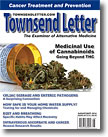Page 1, 2
Reverse Obesity, Reduce Body Fat, and Optimize BMI
Losing weight and getting in shape may be the most difficult of the recommendations to achieve. The benefits of finding a successful long-term strategy for optimizing body mass index are great. An Italian study found that women who had previously been treated for breast cancer and who had a body mass index (BMI) of less than 25 or a waist:hip ratio of less than or equal to 0.85 were 38% more likely to be survivors than those whose BMI was greater than 30 or who had a waist:hip ratio of <0.80.37 That means that a woman who is 5 feet 5 inches tall should reach a goal weight of less than 143 pounds. Unfortunately, gaining weight after diagnosis is common among survivors and is associated with increased recurrence and mortality.38 Every 11 pounds of weight gain is associated with 13% increase in breast cancer mortality.39 Achieving optimal body weight and reducing body fat and waist:hip ratio are not easy for most women and often require the guidance and support of professional trainers and health-care practitioners. The benefits are very real. If this seems daunting, consider doing all the other recommendations first. Eating more healthfully, increasing activity, and drinking more green tea and little alcohol are a good combination that may result in optimal body mass index and level of fitness.
Conclusion
So, the answer to the question "what now?" is to make at least one positive choice toward posttreatment self-care. It is unlikely that you will be able to do them all. Be kind to yourself and create realistic goals that will be long lasting. If these healthy survivorship strategies seem too much to achieve, ask a licensed naturopathic doctor to help you to help yourself. If someone you care about has had breast cancer, let her know this empowering information. If you are a practitioner, make this article and chart (Lifestyle Strategies For Reducing Recurrence and Increasing Survival of Breast Cancer) into a handout for patients. This information is free and easy to distribute, so tweet, post, or shout from the rafters, "Take control of your survivorship, sister!"
Notes
1. Pierce JP, Stefanick ML, Flatt SW, et al. Greater survival after breast cancer in physically active women with high vegetable-fruit intake regardless of obesity. J Clin Oncol. 2007;25(17):2345–2351.
2. Holmes M, Chen W, Feskanich D, et al. Physical activity and survival after breast cancer diagnosis. JAMA. 2005;293:2479–2486.
3. Irwin M, Smith A, McTiernan A, et al. Influence of pre-and postdiagnosis physical activity on mortality in breast cancer survivors: The healthy, eating and activity and lifestyle study. J Clin Oncol:2008;26(24):3958–3964.
4. Mason C, Alfano CM, Smith AW, et al. Long-term physical activity trends in breast cancer survivors. Cancer Epidemiol Biomarkers Prev. 2013;22(6):1153–1161.
5. Nakachi, K, Sumasi K, Suga K, et al. Influence of drinking green tea on breast cancer malignancy among Japanese patients. Japan J Cancer Res. 1998;89(3) 254–261.
6. Inoue M, Tajima K, Mizutani M, et al. Regular consumption of green tea and the risk of breast cancer recurrence: follow-up study from the Hospital-based Epidemiologic Research Program at Aichi Cancer Center (HERPACC) Japan. Cancer Lett. 2001;167(2):175–182.
7. Seely D, Mills EJ, Wu P, et al. The effects of green tea consumption on incidence of breast cancer and recurrence of breast cancer: a systemic review and meta-analysis. Integr Cancer Ther. 2005;4(2):144–155.
8. Ogunleye AA, Xue F, Michels KB. Green tea consumption and breast cancer risk or recurrence: a meta-analysis. Breast Cancer Res Treat. 2010;119:477–484.
9. USDA Database for the Flavonoid Content of Selected Foods [online document]. 2007. Available at data1.org/u/usda-database-for-the-flavonoid-content-of-selected-foods-e1402-book.pdf.html. Accessed on May 1, 2014. (Editor note: This site acted in a questionable way. Proceed with caution.)
10. Caffeine content for coffee, tea, soda and more [Web page]. Mayo Clinic. http://www.mayoclinic.org/healthy-living/nutrition-and-healthy-eating/in-depth/caffeine/art-20049372. Accessed on April, 29, 2014.
11. Unachukwu UJ, Ahmed S, Kavalier A, et al. White and green teas (Camellia sinensis var. sinensis): variation in phenolic, methylxanthine, and antioxidant profiles. J Food Sci. 2010;75(6):C541–C548.
12. Hudson T. Green Tea and women's health [blog post]. Jan. 14, 2007. Dr. Tori Hudson N.D. http://drtorihudson.com/prevention/green-tea-and-women%E2%80%99s-health. Accessed on April 28, 2014.
13. Chow HH, Cai Y, Hakim IA, et al. Pharmacokinetics and safety of green tea polyphenols after multiple-dose administration of epigallocatechin gallate and Polyphenon E in healthy individuals. Clin Can Res. 2003;8(9):3312.
14. Vrieling A, Buck K, Seibold P, et al. Dietary patterns and survival in German postmenopausal breast cancer survivors. Br J Cancer. 1013;108(1):188–192.
15. George SM, Irwin ML, Smith AW, et al. Postdiagnosis diet quality, the combination of diet quality and recreational physical activity, and prognosis after early-stage breast cancer. Cancer Causes Control. 2011;2(4), 589–598.
16. McEligot, AJ, Largetn J, Ziogas A, et al. Dietary fat, fiber, vegetable, and micronutrients are associated with overall survival in postmenopausal women diagnosed with breast cancer. Nutr Cancer. 2006;55(2):132–140.
17. Pierce JP, Natarajan L, Sun S, et al. Increases in plasma carotenoid concentration in response to a major dietary change in women's healthy eating and living study. Cancer Epidemiol Biomarkers Prev. 2006;15:1886–1892.
18. Pierce JP, Natarajan L, Caan BJ, et al. Influence of a diet very high in vegetables, fruit, and fiber and low in fat on prognosis following treatment for breast cancer: the Women's Healthy Eating and Living (WHEL) study. JAMA. 2007;298:289–298.
19. Rock, CL, Flatt, SW, Natarajan L, et al. Plasma carotenoids and recurrence-free survival in women with a history of breast cancer. J Clin Oncol. 2005;23(7)6631–6638.
20. Ingram, D. Diet and subsequent survival in women with breast cancer. Br J Cancer. 1994;69(3):592–595.
21. Thomson, CA, Rock CL, Thompson PA, et al. Vegetable intake is associated with reduced breast cancer recurrence in tamoxifen users: a secondary analysis from the Women's Healthy Eating and Living Study. Breast Cancer Res Treat. 2011;125(2):519–527.
22. Nechuta S, Caan BJ, Chen WY, et al. Postdiagnosis cruciferous vegetable consumption and breast cancer outcome: a report from the After Breast Cancer Pooling Project. Cancer Epidemiol Biomarkers Prev. 2013;22(8):1451–1456.
23. Kaczor T. The effects of soy consumption on breast cancer prognosis. Natural Med J. 2012.
24. Shu XO, Zheng Y, Cai H, et al. Soy food intake and breast cancer survival. JAMA. 2009;302(22):2437–2443.
25. USDA Database for the Isoflavone Content of Selected Foods [online document]. USDA. http://www.ars.usda.gov/SP2UserFiles/Place/12354500/Data/isoflav/Isoflav_R2.pdf. Accessed April 30, 2014.
26. Shu et al. Op cit.
27. Guha N, Kwan ML, Quesenberry CP Jr, et al. Soy isoflavones and risk of cancer recurrence in a cohort of breast cancer survivors: the Life After Cancer Epidemiology study. Breast Cancer Res Treat. 2009;118(2):395–405.
28. Kang X, Zhang Q, Wang S, et al. Effect of soy isoflavones on breast cancer recurrence and death for patients receiving adjuvant endocrine therapy. CMAJ. 2010;182(17):1856–1862.
29. Chi F, Wu R, Zeng YC, et al. Post-diagnosis soy food intake and breast cancer survival: a meta-analysis of cohort studies. Asian Pac J Cancer Prev. 2013;14(4):2407–2412.
30. Wood HD, Park KS, Ro J, et al. Differential influence of dietary soy intake on the risk of breast cancer recurrence related to HER2 status. Nutr Cancer. 2012;64(2):198–205.
31. Kwan ML, Kushi LH, Weltzien E, et al. Alcohol consumption and breast cancer recurrence and survival among women with early-stage breast cancer: the life after cancer epidemiology study. J Clin Oncol. 2010;28(29):4410–4416.
32. Franceschi S, Dal Maso L, Zucchetto A, et al. Prospective Analysis of Case–Control Studies on Environmental Factors and Health (PACE) study group. Alcohol consumption and survival after breast cancer. Cancer Epidemiol Biomarkers Prev. 2009;18(3):1011–1012.
33. Gou YU, Xie DX, Yang KH, et al. Alcohol consumption and breast cancer survival: a meta-analysis of cohort studies. Asian Pac J Cancer Prev. 2013;14(8):4785–4790.
34. Schootman M, Deshpande AD, Lynskey MT, et al. Alcohol outlet availability and excessive alcohol consumption in breast cancer survivors. J Prim Care Community Health. 2013;4(1):50–58.
35. Kwan ML, Chen WY, Flatt SW, et al. Postdiagnosis alcohol consumption and breast cancer prognosis in the after breast cancer pooling project. Cancer Epidemol Biomarkers Prev. 2013;22(1):32–41.
36. Gou et al. Op cit.
37. Dal Maso L, Zuchetto A, Talamini R, et al. Effect of obesity and other lifestyle factors on mortality in women with breast cancer. Int J Cancer. 2008;123(9):2188–2194.
38. Carmichael AR. Obesity as a risk factor for development and poor prognosis of breast cancer. BJOG. 2006;113(10):1160–1166.
39. Nichols HB, Trentham-Dietz A, Egan KM, et al. Body mass index before and after breast cancer diagnosis: associations with all-cause, breast cancer, and cardiovascular disease mortality. Cancer Epidemol Biomarkers Prev. 2009;18(5):1403–1409.
 Barbara MacDonald is a licensed naturopathic doctor, acupuncturist, and Chinese herbalist practicing in Camden, Maine. She is coauthor of the text The Breast Cancer Companion: A Complementary Care Manual: The Practitioner's Guide to Support Women Through Conventional Cancer Treatment (3rd edition), to be published later this year. She is a 1997 graduate of National College of Naturopathic Medicine; a member of the American Association of Naturopathic Physicians, the Oncology Association of Naturopathic Physicians, and the Maine Association of Naturopathic Doctors and Acupuncturists; and a charter member of Destination Wellness Midcoast Maine. Dr. MacDonald has a general practice wherein she facilitates those with chronic illness, cancer, and other health challenges to eliminate obstacles to optimal health and inspires them to fully express their highest and best selves. Barbara MacDonald is a licensed naturopathic doctor, acupuncturist, and Chinese herbalist practicing in Camden, Maine. She is coauthor of the text The Breast Cancer Companion: A Complementary Care Manual: The Practitioner's Guide to Support Women Through Conventional Cancer Treatment (3rd edition), to be published later this year. She is a 1997 graduate of National College of Naturopathic Medicine; a member of the American Association of Naturopathic Physicians, the Oncology Association of Naturopathic Physicians, and the Maine Association of Naturopathic Doctors and Acupuncturists; and a charter member of Destination Wellness Midcoast Maine. Dr. MacDonald has a general practice wherein she facilitates those with chronic illness, cancer, and other health challenges to eliminate obstacles to optimal health and inspires them to fully express their highest and best selves.
Contact: www.camdenwholehealth.com or drbarbmacdonald@yahoo.com; 207-230-1131.
Page 1, 2 |
![]()
![]()
![]()





 Barbara MacDonald is a licensed naturopathic doctor, acupuncturist, and Chinese herbalist practicing in Camden, Maine. She is coauthor of the text
Barbara MacDonald is a licensed naturopathic doctor, acupuncturist, and Chinese herbalist practicing in Camden, Maine. She is coauthor of the text